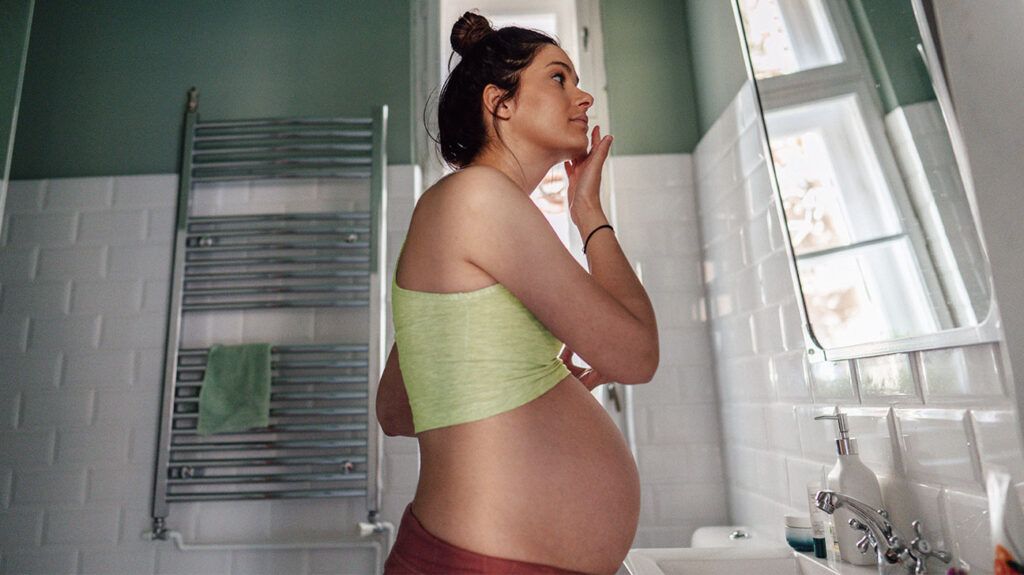Pregnancy alters how the immune system works, meaning pregnant people are more at risk of severe illness from COVID-19. The COVID-19 vaccine reduces this risk.
There is no evidence that the vaccine is unsafe for the parent or fetus. In fact, research so far suggests that people who get the vaccine may have a lower risk of pregnancy complications, such as preterm birth and pregnancy loss.
For this reason, doctors advise people to get a COVID-19 booster during pregnancy.
In this article, we will explore whether and when people should get a COVID-19 vaccine during pregnancy, whether they are safe, and the side effects.

Generally, health experts recommend that pregnant people get the COVID-19 vaccine, or a booster, during pregnancy.
A
- lower rates of COVID-19, particularly in those who had a booster
- fewer preterm births
- fewer stillbirths
Another potential benefit of getting a COVID-19 vaccine during pregnancy is that it may offer some immunity to the newborn baby.
The
People can get the COVID-19 vaccine at any time during pregnancy.
COVID-19 vaccines become less effective over time. In addition, new variants of COVID-19 have emerged since the original vaccine appeared.
This is why doctors recommend that, even if a person has had the standard number of COVID-19 shots, they get an additional booster during pregnancy.
Ideally, people should get the COVID-19 vaccine as early in pregnancy as possible. If a person has recently had their first or second COVID-19 shot, they need to wait
It is safe to have the COVID-19 vaccine alongside others, such as the flu shot. People can also get it while breastfeeding.
The COVID-19 vaccine can cause side effects, but they are usually temporary and mild. They affect pregnant and nonpregnant people in
Some common side effects include:
- pain, swelling, and redness or other color changes at the injection site
- fatigue
- headache and muscle pain
- nausea
- fever
These symptoms are a sign the vaccine is working to stimulate an immune response. Few are any cause for concern.
However, a fever from any cause can have links to pregnancy complications. A healthcare professional can advise on using acetaminophen, in moderation, to reduce fever if it occurs.
Rare side effects and reactions
There may also be an association between mRNA vaccines for COVID-19 and myocarditis and pericarditis, which are types of heart inflammation. However, these conditions are rare, and they are treatable.
Previously, another type of vaccine was available in the United States, known as the J&J/Janssen vaccine. This vaccine is no longer available because of concerns that it may increase the risk of Guillain-Barré syndrome and thrombosis with thrombocytopenia syndrome.
Below are some common questions about the safety of the COVID-19 vaccine during pregnancy.
Does the COVID-19 vaccine affect pregnancy?
There is
A
Does the COVID-19 vaccine cross the placenta?
A preprint of a
However, this study has not undergone peer review yet.
Does the COVID-19 vaccine cause preterm birth?
There is no evidence that the COVID-19 vaccine increases the risk of preterm birth. In fact,
Long-term effects or complications from the COVID-19 vaccine are
Research is ongoing, but so far, there is no evidence that exposure to the vaccine during pregnancy causes long-term health problems in children.
A
- bleeding
- blood clots
- infection
- nervous system disorders
- digestive, respiratory, or circulation problems
- death
The risk of neonatal mortality was slightly lower, as was the risk of other conditions, such as brain injury due to a lack of oxygen and bleeding in the brain.
If a person gets COVID-19 during pregnancy, it can be more severe than usual. For instance, a person may:
- have more severe symptoms
- be more likely to spend time in a hospital
- be more likely to need intensive care or a respirator
- have a higher risk of preterm birth or pregnancy loss
- have a higher risk of death
The risk is higher in those with other health conditions, such as diabetes.
Sometimes, people who get COVID-19 develop lingering symptoms that continue after the initial infection. This is known as long COVID.
A
Staying up-to-date with COVID-19 vaccines
Still confused?Expert help is available online from MotherToBaby through:
- Phone: 866-626-6847
- Text: 855-999-3525
- Online live chat: MotherToBaby
The COVID-19 vaccine is an effective way to reduce the risk of serious illness from COVID-19 during pregnancy. It may also reduce the risk of pregnancy loss and preterm birth, and it may help the fetus develop some immunity, too.
For those who have already had all their COVID-19 shots, a doctor may recommend getting a booster during pregnancy. This is because the protection these vaccines offer wears off over time. Ideally, people should get the shot as soon as they can.
There is no evidence that the COVID-19 vaccine poses any risk to pregnant people or fetuses, nor that it crosses the placenta. If a person has any other questions or concerns about the vaccines they need, they can speak with a medical professional.
